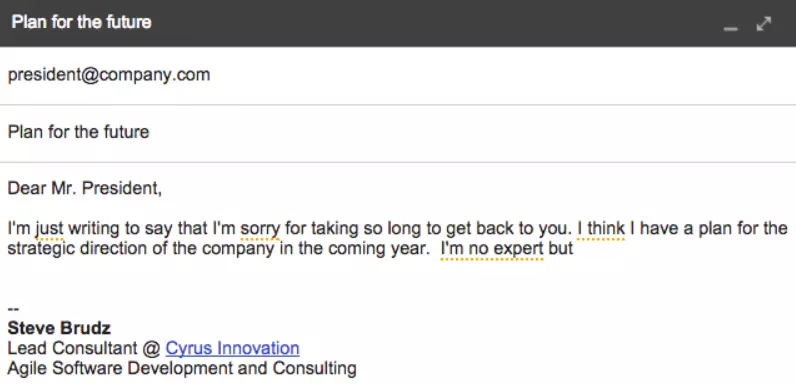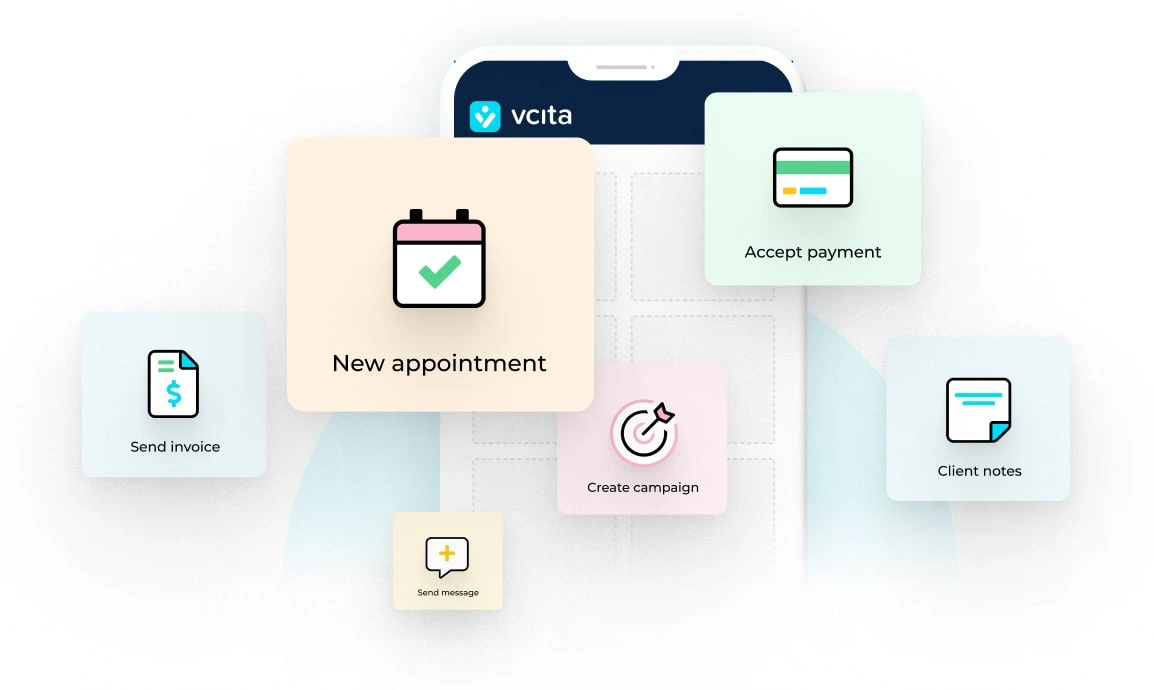You’re emailing a client who just ghosted you that you’ll be charging her for the appointment she had booked. You quote your cancellation policy, link to it, thank her, and are about to push “send”.
And then you get that twitchy feeling.
What if you’re being too pushy? What if you offend your client and lose her business forever?
Relax. You’re not alone.
Last month, Designer and illustrator Dani Donovan broke the internet with her viral Instagram post on how to stop writing passive, over apologetic emails. Her post won nearly 13,000 likes. See, we told you it wasn’t just you.
Now, we’d like to push this point a little further by turning your attention to ten additional phrases you should wipe out of your email lexicon for good.
1. Don’t use: “I’m sorry to bother you.”
Use: “I thought you should know ASAP.”
“I’m sorry,” when used appropriately, can be a powerful healing phrase. The problem is that it’s overused and makes you sound ineffectual.
And practically speaking, are you really that sorry? And should you be? After all, you’re not intruding on anyone, you’re simply trying to communicate an important message. Otherwise, you wouldn’t be emailing them in the first place, right?
2. Don’t use: “Not sure if you saw my last email.”
Use: “It’s important for me to know…
Hmm. So you’re not sure if they saw your email? More like, “Get back to me already! Read your freakin’ messages!” That’s what you’re really saying, no?
“Not sure you saw my last email” ranked as the most hated phrase for people to see in a work email, according to a survey done by Adobe. It was closely followed by similar phrases like “per my last email” “any updates on this?” and “re-attaching for your convenience.” Bottom line? People don’t like passive-aggressive hints. Need an answer? Say that clearly!
3. Don’t use: “I just wanted to tell you that…”
Use: Nothing.
That phrase is filler. You mean to sound polite and unassuming, but instead, you’re taking up your correspondent’s time reading words that mean, well, nothing. Show them you value their time by just writing what it was you wanted to tell them, without words of introduction or conclusion.
See what we did there?
4. Don’t use: “Let’s touch base.”
Use: “Let’s discuss at [proposed date and time]
Are you using “let’s touch base” to blow someone off? Because that’s how it comes across. Loose agendas and vague plans can sound like your kid’s classmate’s mom air-kissing you in the street, while mouthing, “Sure, we’ll do lunch” when, of course, neither party has any intention of dining together.
Don’t be her.
While nobody wants to hear “no”, if you have no intention of following up, be clear. “I’m absolutely slammed right now and won’t have the capacity to handle this.” Or, if you want to move forward, “Let’s discuss (topic) at (date and time)” lets the other party know that you’re both interested and organized.
5. Don’t use: “I’ll try/I’ll do my best”
Use: “I plan to”
With “I’ll try”, you probably mean “I plan to accomplish the task, but I don’t want you to be mad if it doesn’t happen exactly when or how you thought it would.”
That is insecurity talking.
If you really are concerned that you can’t meet the deadline, give yourself more leeway (clearly and specifically) when it comes to the results. “It’s unlikely it will be done by Thursday evening, but I can have it for you by Friday morning.”
6. Don’t use: “Is that okay?”
Use: “Let me know if this poses an issue for you.”
Once you’ve made a clear statement about what you can do and when, you might be tempted to tack on an, “Is that okay?” to soften up the impression. This is two steps forward, one step back. Remember, you’re the expert. You know your profession and your market.
Yes, you need to be polite. But don’t fall into the trap of trying to please everyone at your expense.
7. Don’t use: “If not, no worries!”
Use: Nothing.
“Don’t worry, be happy” is a great motto. Just not at work. When you receive an email with tons of apologies from someone who didn’t deliver on what they promised, and you’re able to manage, you can be magnanimous and tell them, “Don’t worry about it.” That is the only time the “no worries” philosophy flies at work.
When you’re asking someone to deliver, however, don’t contradict your stated request by adding on a “If not, no worries” at the end. If they can’t commit themselves, it’s up to them to make that calculation and tell you.
8. Don’t use: “I only read this email now because…”
Use: Nothing.
You don’t need to make excuses.
You don’t need to be available 24/7 to everyone.
Unless your mistake is huge (you’re on deadline and completely missed an important communication or directive) you can simply answer the request in a timely fashion and skip the apology altogether. You’re allowed to have hours of availability and limits. You don’t need to explain!
9. Don’t use: “I’m no expert, but…”
Use: Nothing.
Most of us are experts in a very limited number of subjects. So even if you make a statement about a particular topic, unless you claim to be an expert, the default assumption is that you’re not one.
Obviously, don’t present yourself as an expert if you’re not. But don’t go out of your way to put yourself down or minimize your input.
10. Don’t use: “I think that this might…”
Use: “I believe that this will…”
Use strong words. If you have the confidence to say it, have the confidence to stand behind it!
How To Effectively Stop Using “Just” and “Please” So Often
Ever try to quit smoking? You’ve done it more than once, right? Yah, us too.
One of the most challenging things in life is breaking an ingrained habit. You must stop compromising your expertise by communicating in non-boss-speak. Sometimes, in order to break a lifelong habit, you need someone looking over your shoulder, giving you a little elbow poke and whispering, “Dude. You’re doing it again. Stop.” If you use Gmail or G Suite and the Chrome browser for your work emails, this “Just Not Sorry” plugin could be your new best friend.

It will underline any phrases it spots in your email that undermine the power of your message. Even better, when you mouse over the underline, you’ll get an explanation of why that phrase weakens what you’re trying to say.
Don’t Be Scared to Lose What Needs to Be Lost
Writing your work emails like a boss is about respecting yourself, your needs, your abilities, and your limits. It’s about respecting the recipient of your email through clear, calm and confident communication.
You are a professional. You know what you’re doing. Present confidence in your emails, and you’ll attract just the right kind of clients and staff members to your business.




























